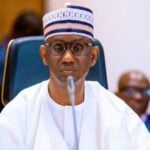President Bola Ahmed Tinubu has announced Nigeria’s ambitious target to produce 10 million tonnes of liquid steel by 2030 and create over 500,000 jobs while speaking at the inaugural National Stakeholders Summit on Steel Development in Abuja on Wednesday.
Tinubu also stressed that the steel industry is central to national industrialisation, economic diversification, and security.
The summit, themed “Rebuilding and Consolidating Nigeria’s Steel Industry: Collaborative Action for Sustainable Growth and Global Competitiveness,” was convened to chart a roadmap for revitalising the nation’s steel sector, which continues to rely heavily on imports despite abundant local deposits of iron ore, limestone, and coal.
Tinubu, represented by Vice President Kashim Shettima, noted that the steel industry cannot be revitalized by the government alone; it requires the participation of private investors, the innovation of Nigerian universities, the skills of the workforce, and the patronage of the people, stressing the administration’s commitment to overcoming past failures and building a self-reliant, competitive steel sector.
Key initiatives outlined at the summit include operationalising the Ajaokuta Steel Company and the National Iron Ore Mining Company (NIOMCO), conducting technical and financial audits, and exploring strategic partnerships with international investors to complete and commission the Ajaokuta Steel Plant. Plans for five mini-LNG plants at Ajaokuta, an industrial park with a free trade zone, and collaboration with the Ministry of Defence and DICON to manufacture military hardware were also announced.
Senator Patrick Ndubueze, Chairman of the Senate Committee on Steel Development, pledged the Senate’s unwavering support for the sector’s growth, urging stakeholders to translate ideas into tangible actions.
Highlighting the Ajaokuta Steel Complex, he noted that while 38 of its 43 factories were completed years ago, more than 20 are capable of independent operation if the central utility is serviced.
He called for a strategic review, unbundling, and concessioning of the factories to capable Nigerian or verified foreign firms to boost employment and local production, criticizing past wholesale concessions. Ndubueze reaffirmed that legislation will continue to attract capital, safeguard investments, and empower Nigerian entrepreneurs, urging the summit to be a turning point for positioning Nigeria as a hub for industrial excellence in Africa.
Minister of Steel Development, Prince Shuaibu Abubakar Audu, reiterated the sector’s central role in industrialisation and economic diversification, noting that robust local steel production would reduce Nigeria’s annual $4 billion import bill.
He detailed government incentives to attract investors, including capital allowances, import duty exemptions, tax holidays, and policies requiring 30% of steel inputs for government projects to be locally sourced.
Audu emphasised public-private partnerships, industrial parks, mini-LNG plants, and collaboration with the Ministry of Defence to manufacture military hardware, stressing that these initiatives would drive domestic raw material consumption, create jobs, and establish Nigeria as a regional steel hub.
Meanwhile, Minister of Solid Minerals Development, Dr. Dele Alake, highlighted Nigeria’s emerging industrial leadership with several high-profile lithium processing and refinery projects nearing completion.
He revealed that a $600 million lithium processing plant near the Kaduna-Niger border and a $200 million refinery near Abuja will soon be commissioned, with additional plants in Nasarawa expected to go live by the end of 2025.
Alake emphasised strict sector enforcement, citing the deployment of over 2,350 mining marshals, the arrest of more than 300 illegal operators, and the convictions of over 20, including foreigners.
He urged investors, academia, labour unions, and state governments to adopt a cluster-based industrial approach integrating mining, processing, and manufacturing, ensuring Nigeria’s steel and mineral sectors are competitive, export-ready, and job-creating engines of growth.
Minister of Marine and Blue Economy, Adegboyega Oyetola, highlighted steel’s critical role in shipbuilding, port facilities, offshore platforms, and fishing vessels, stressing that a reliable domestic supply would reduce import dependence, cut costs, improve project timelines, and support maritime infrastructure development.
Similarly, Minister of Transportation, Sai’du Ahmed Alkali, described the summit as a timely forum to implement the 10-year national steel roadmap, optimize private steel rolling mills, and leverage Nigeria’s vast natural resources within a strong regulatory framework.
Minister of Industry, Trade, and Investment, Olajumoke Oduwole, emphasized the untapped potential across the steel value chain, from iron ore mining to steel rolling, fabrication, and production of critical inputs for construction, automotive, energy, and manufacturing sectors. She noted that domestic value addition, international partnerships, technology transfer, and targeted reforms will reduce import dependence, create jobs, and build Nigeria’s path toward a $1 trillion economy by 2030.
In his welcome remarks, Dr. Chris Osa Isokpunwu, Permanent Secretary of the Ministry of Steel Development, described the summit as a pivotal platform to chart a new course for Nigeria’s steel sector. He stressed that steel is not merely a commodity but the backbone of national development, underpinning railways, bridges, manufacturing, energy, and defense.
Dr. Isokpunwu urged all stakeholders to engage actively, share innovative ideas, and forge strategic partnerships, noting that outcomes from the summit would inform the National Strategic Plan of Action for the Steel and Metallurgical Sector, positioning Nigeria as a competitive player in the global steel market.
With multi-stakeholder engagement, strategic partnerships, and robust regulatory frameworks now in place, Nigeria appears poised to transform its steel industry into a cornerstone of national industrialisation, a major driver of economic diversification, and a hub for sustainable growth and continental leadership.
ALSO READ TOP STORIES FROM NIGERIAN TRIBUNE
WATCH TOP VIDEOS FROM NIGERIAN TRIBUNE TV
- Relationship Hangout: Public vs Private Proposals – Which Truly Wins in Love?
- “No” Is a Complete Sentence: Why You Should Stop Feeling Guilty
- Relationship Hangout: Friendship Talk 2025 – How to Be a Good Friend & Big Questions on Friendship
- Police Overpower Armed Robbers in Ibadan After Fierce Struggle






